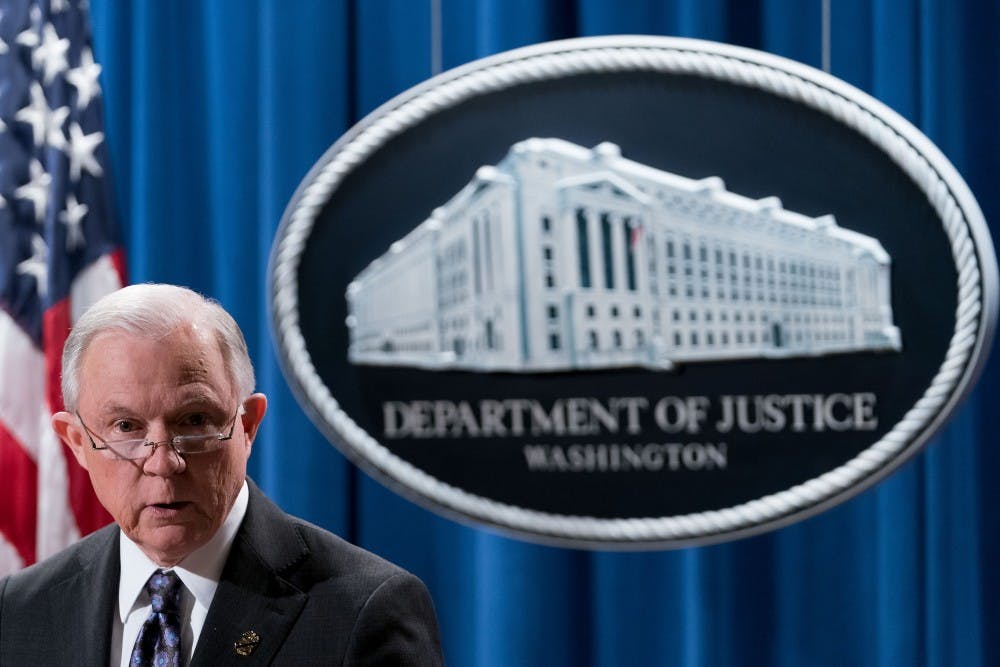In the first days of 2018, Attorney General Jeff Sessions announced that the Justice Department would no longer be holding back from prosecuting marijuana users and sellers in states where it had been legalized. Although it’s possible that this is just part of the current administration’s gleeful insistence on tearing down everything that ever happened under President Obama, it’s probably more likely that it’s just an extension of his weird personal vendetta against marijuana and the people who smoke it. (Remember how he thought the Ku Klux Klan was “OK, until he learned that they smoked marijuana?" We confirmed that guy.)
The move probably didn’t come as a surprise to anyone. Few people have accused the Trump administration of a desire to slow down the mass incarceration machine, or to come to the aid of black people who are being disproportionately affected by current marijuana prohibition laws. However, it does present the Democrats with a perfect opportunity to make a good moral and electoral choice, include the legalization of pot in their legislative agenda and, in 2020, include it in their platform.
In their 2016 platform, Democrats talked about states' rights to legalize marijuana, removing the drug from Schedule 1 and recognizing the racial disparities in marijuana enforcement. These things are all well and good, but they’re not enough. Democrats would be better off from a moral standpoint if they didn’t just “recognize” the disparate impact of drug laws on people of color, but did something about it — and the best thing to do to that end is to legalize the drug.
There’s no way to magically erase racial bias in enforcement of these laws. It’s a huge systemic problem that will continue as long as the laws are in place, thanks to stereotypes and profiling. The laws themselves have their origin in racism, thanks to the focused campaign of lies about pot pushed by the first Federal Bureau of Narcotics commissioner, Harry Ansligner. He injected the idea that using pot made black and Hispanic people “forget their place” in society into the mainstream.
Furthermore, there’s no reason to believe people like Kansas state Rep. Steve Alford, who says black people are more affected by marijuana because of their “character makeup” and genetics, are going to suddenly try to make the criminal justice system more fair for a group of people who they think are “basically users.”
Does the Democratic party want to continue making patently ineffective attempts to gently correct a systemic bias by “recognizing” its presence, or does it want to make it impossible for bias in enforcement of marijuana laws to ruin any more lives?
There’s a chance here for Democrats to put a stop to the continuation of decades of injustice. This should sound like a great idea for a party interested in recognizing racial bias in drug law enforcement and deprioritizing incarceration for drug users. But, of course, there’s the frustratingly credible-sounding stopping point of electoral viability. It’s so easy for Republicans to spin a party-wide swing towards supporting legalization as being “soft on crime.” And in this country, we don’t like “soft on crime.” Could Democrats be risking seats taking a chance on ending this part of the drug war?
In my opinion, it’s a concern they should ignore. In an ideal world, they would ignore it because it’s the job of a politician to advocate for the interests of their constituents rather than just to get re-elected. But in this world, they should still ignore it, because marijuana legalization is a popular enough position that supporting it is unlikely to sink them. Gallup found last October that 64 percent of Americans support marijuana legalization, and the 28 percent of Democrats who don’t are probably unlikely to drop support for their party over that issue, given the amount of party loyalty we’ve seen on display in recent years. Moreover, even a slim majority of Republicans (51 percent) support it, a number that is rising over time, which probably means that in the future Sessions will be an outlier in his own party. The Democrats would put themselves on the right side of history and opinion trends by making this their issue.
As we’ve seen in 2016, and the recent Alabama Senate race, black people are the foundation of the Democratic base. When they are motivated (and able) to turn out, Democrats win. When they aren’t, Democrats lose. Although fighting injustice should be a Democratic priority regardless of whether it wins them votes, they shouldn’t ignore that acting in the best interests of those voters who are in greater danger from the enforcement of marijuana prohibition will make them a more attractive choice.
A commitment to real justice at the national level, rather than just a recognition of current injustice, might help them in 2018 and beyond.

